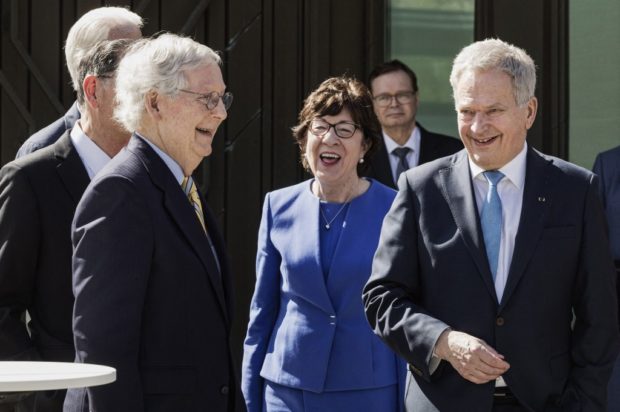Swedish, Finnish MPs debate NATO membership

(L-R) US Senate Minority Leader Mitch McConnell, US Republican Senator Susan Collins and Finland’s President Sauli Niinisto chat after their meeting at the President’s official residence Mantyniemi in Helsinki, Finland, on May 16, 2022. (Photo by Roni Rekomaa / Lehtikuva / AFP) / Finland OUT
STOCKHOLM, Sweden — Lawmakers in Finland and Sweden on Monday debated their respective NATO bids, as the two neighbors prepare to submit applications this week as a deterrent against Russian aggression.
Finland officially announced its intention to join NATO on Sunday as Sweden’s ruling party said it backed membership, paving the way for a joint application.
The move is a dramatic turnaround from the two countries’ military non-alignment policies, dating back more than 75 years for Finland and two centuries for Sweden.
In Helsinki, parliament began a marathon session with over 150 of 200 MPs asking to speak, following a membership proposal presented on Sunday by President Sauli Niinisto and Prime Minister Sanna Marin.
“Our security environment has fundamentally changed,” Marin told parliament.
Article continues after this advertisement“The only country that threatens European security, and is now openly waging a war of aggression, is Russia,” she said.
Article continues after this advertisementRussia has repeatedly warned Finland and Sweden of consequences if they apply to join NATO.
“This is another grave mistake with far-reaching consequences,” Deputy Foreign Minister Sergei Ryabkov was quoted as saying by Russian news agencies on Monday.
Finland, which shares a 1,300-kilometer (800-mile) border with Russia, has a long shared history with Russia.
It spent more than a century as part of the Russian empire until it gained independence in 1917. It was then invaded by the Soviet Union in 1939.
Finns put up a fierce fight during the bloody Winter War, but were ultimately forced to cede a huge stretch of their eastern Karelia province in a peace treaty with Moscow.
An overwhelming majority of Finland’s 200 MPs — at least 85 percent — back the decision to join NATO after Marin’s Social Democratic Party on Saturday said it was in favor of joining.
Finnish public opinion is also strongly in favor of membership.
According to recent polls, more than three-quarters of Finns want to join the alliance, almost triple the level seen before the war in Ukraine began on February 24.
Meanwhile, a group of US senators, including Republican Leader Mitch McConnell, visited Helsinki on Monday for talks with President Niinisto.
“The goal in the United States will be to approve (Finland’s) admission as rapidly as possible”, McConnell said after the meeting.
Sweden ‘vulnerable’ outside NATO
Meanwhile in Sweden, Prime Minister Magdalena Andersson was consulting parliament on Monday before announcing her government’s official intention to apply, though lawmakers are not expected to vote on the issue.
Her Social Democratic Party came out in favour of joining the alliance on Sunday, securing a firm majority in parliament for membership. Only two of eight parties are opposed to membership.
The turnaround by her party is dramatic, having opposed NATO membership since the birth of the alliance, with Andersson herself expressing opposition as recently as March.
Swedish public support for NATO membership has also risen dramatically, albeit lower than in Finland at around 50 percent — with about 20 percent against.
Andersson acknowledged that Sweden’s decision to join NATO was closely tied to Finland’s.
As the only country in the Baltic Sea region outside of NATO, Sweden would find itself “in a very vulnerable position”, she told parliament, citing the risk of “Russia increasing the pressure on Sweden”.
She also stressed Sweden’s “extensive military cooperation” with Finland.
If Sweden doesn’t join, and “Finland as a NATO member focuses more on its cooperation with NATO countries, Sweden’s defence capability decreases at a time when it instead needs to be strengthened.”
But if Sweden were to join, cooperation and defense capabilities around the Baltic Sea “would increase drastically”.
“The best thing for our country’s security is therefore for Sweden to apply for membership in NATO and to do it together with Finland,” she said.
The Left Party, which is opposed to membership, meanwhile lamented that Sweden did not put the question to the public in either an election or referendum, calling it “deeply problematic.”
RELATED STORY:
Nato expects Turkey not to hold up Finland, Sweden membership